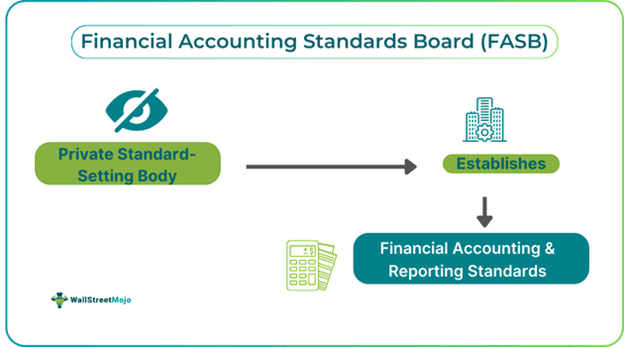Table of Contents
What Is The Financial Accounting Standards Board (FASB)?
The Financial Accounting Standards Board, or FASB, is an organization that establishes financial accounting and reporting standards. These standards apply to both private and public companies, as well as not-for-profit organizations. It is an independent, private, not-for-profit organization based in Norwalk, Connecticut.

The U.S. Securities and Exchange Commission (SEC), the American Institute of Certified Public Accountants (AICPA), and state Boards of Accountancy recognize the FASB. It works to develop and publish accounting standards transparently, fostering consistent financial reporting. This provides necessary information to stakeholders. The development of standards is overseen by the board of trustees from the Financial Accounting Foundation (FAF).
Key Takeaways
- The Financial Accounting Standards Board (or FASB) is a private, non-profit entity established in 1973. The U.S. SEC established the organization to regulate and set standards for companies.
- It operates with a board, and the Financial Accounting Standards Board members are appointed for a five-year term.
- The standards help in the comparison of various companies on similar factors, providing creditors, investors, and other vested parties with the necessary information to make informed decisions.
- It helps in capital resource allocation and results in economically efficient markets.
How Does Financial Accounting Standards Board Work?
The Financial Accounting Standards Board develops financial accounting standards and reporting practices. It is a unique body, operated and financed entirely by the private sector, though its decisions are supported by federal law and recognized by the SEC. The FASB typically consists of 5-7 full-time members who serve 5-year terms, with the possibility of reappointment for a second term.
The FASB's mission is to establish and improve accounting and reporting standards, ensuring they reflect changes in the business environment. It also promotes the convergence of various accounting standards globally and seeks to address gaps in the reporting process.
The FASB plays a critical role in financial accounting, which is essential to the broader economy. The consistency and comparability of standards help investors and creditors make informed decisions, leading to more efficient resource allocation, particularly capital. Decisions based on sound financial information can contribute to a more efficient economy, ultimately benefiting society.
History
The Financial Accounting Standards Board (FASB) was established in 1973 by the Financial Accounting Foundation (FAF), not directly by the SEC. The FASB was created as a response to the need for an independent standard-setting body for financial reporting. Initial efforts to establish uniform financial reporting practices date back to 1917 when the Federal Reserve Board (FRB) published its bulletin "Uniform Accounting." However, these efforts were halted due to the economic turbulence of the 1930s.
Subsequent attempts to create consistent reporting standards continued over the decades, but none were fully successful until the formation of the Wheat Committee in 1971. The committee, led by Francis Wheat, published a report in March 1972 that recommended a new, independent structure for setting accounting standards. This new structure included the establishment of the Financial Accounting Foundation (FAF), the Financial Accounting Standards Advisory Council (FASAC), and the FASB.
The FASB operates under the oversight of the FAF, which was founded in 1972 to ensure a robust framework for standard-setting. The FASAC advises the FASB on its projects and priorities before decisions are made. Although the FASB is a private sector entity, its authority is backed by the Securities Acts of the 1930s, which give the U.S. Securities and Exchange Commission (SEC) the power to oversee accounting standards for publicly traded companies.
Functions
Some of the functions undertaken by the FASB are the following:
- It aims to develop high-quality standards that are relevant, reliable, and unbiased.
- To build a framework that establishes a collection of broad rules, accepted principles, guidelines, and other fundamental concepts.
- Resolving differences between parties regarding the application of rules to various institutions.
- Providing high-quality information that is useful to creditors, investors, and other relevant stakeholders who require such information for decision-making.
Importance
Some key points that highlight the importance of the FASB are the following:
- It provides financial information regarding an economic entity to interested stakeholders.
- The information reduces uncertainty in the decision-making process.
- The reporting standards serve as a common basis that allows for the comparison of different companies.
- The standards help in reducing recording errors and biases.
Financial Accounting Standards Board vs IASB
The IASB and FASB are both responsible for developing financial reporting and accounting standards. However, they differ in their operations. Some key differences are as follows:
Concept
- The FASB is an independent, non-profit organization that establishes financial accounting and reporting standards for public and private companies, as well as not-for-profit organizations within the U.S.
- On the other hand, the International Accounting Standards Board (IASB) is responsible for approving and creating International Financial Reporting Standards (IFRS), which are used globally.
Operations
- The FASB is primarily focused on developing standards for national-level (U.S.) operations.
- The IASB is focused on international standards and aims for global consistency in financial reporting.
Implementation Review and Procedure
- The FASB lacks a formal, dedicated post-implementation review process. Any issues with new reporting standards are typically addressed by the SEC, and if needed, the FASB revises the standards.
- The IASB has a formal post-implementation review process to evaluate the long-term effects of new standards. Once implemented, the IASB standards tend to remain in effect for extended periods.
